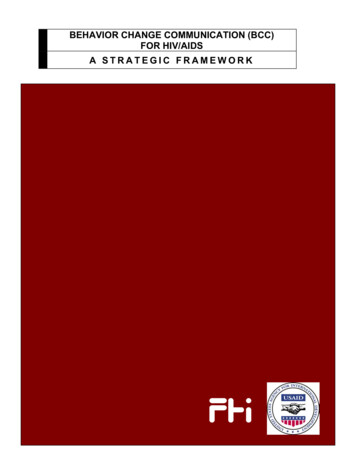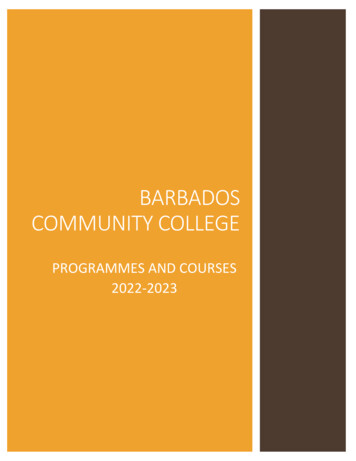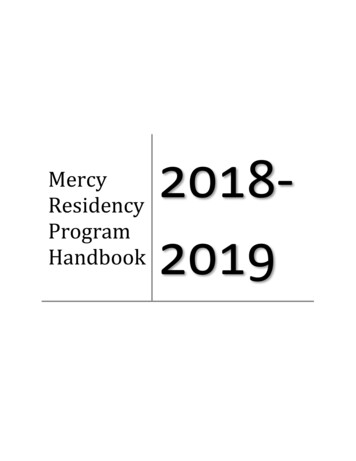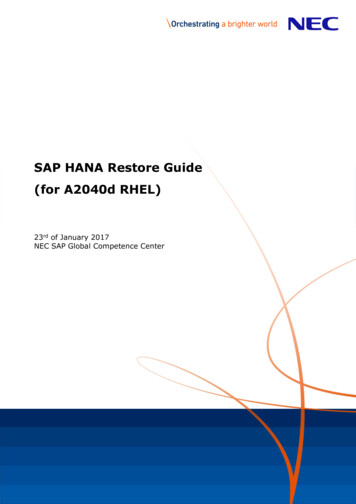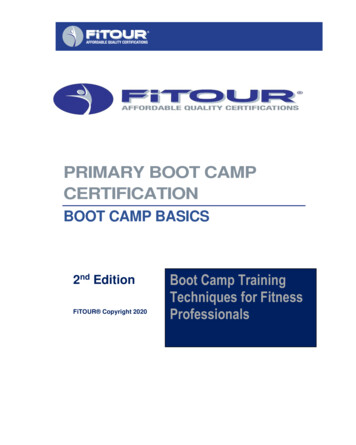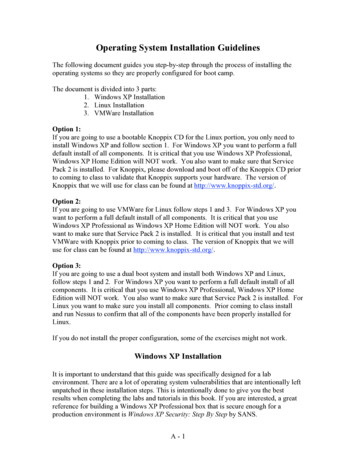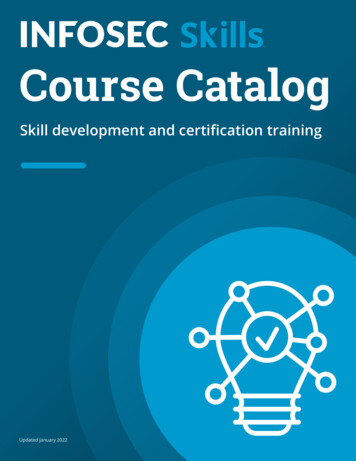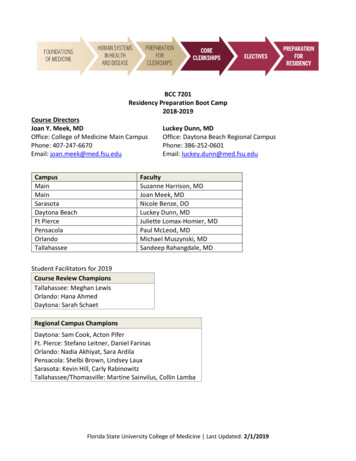
Transcription
BCC 7201Residency Preparation Boot Camp2018-2019Course DirectorsJoan Y. Meek, MDOffice: College of Medicine Main CampusPhone: 407-247-6670Email: joan.meek@med.fsu.eduCampusMainMainSarasotaDaytona BeachFt PiercePensacolaOrlandoTallahasseeLuckey Dunn, MDOffice: Daytona Beach Regional CampusPhone: 386-252-0601Email: luckey.dunn@med.fsu.eduFacultySuzanne Harrison, MDJoan Meek, MDNicole Benze, DOLuckey Dunn, MDJuliette Lomax-Homier, MDPaul McLeod, MDMichael Muszynski, MDSandeep Rahangdale, MDStudent Facilitators for 2019Course Review ChampionsTallahassee: Meghan LewisOrlando: Hana AhmedDaytona: Sarah SchaetRegional Campus ChampionsDaytona: Sam Cook, Acton PiferFt. Pierce: Stefano Leitner, Daniel FarinasOrlando: Nadia Akhiyat, Sara ArdilaPensacola: Shelbi Brown, Lindsey LauxSarasota: Kevin Hill, Carly RabinowitzTallahassee/Thomasville: Martine Sainvilus, Collin LambaFlorida State University College of Medicine Last Updated: 2/1/2019
ContentsOverview . 3Description . 3Objectives. 3Learning Objectives. 3Components . 4Course Format. 4Professionalism . 5Small Group Discussions . 5Evaluation and Grading . 5Description of Student Assessment Methods and Grading . 5Evaluation . 5Course Specific Grading . 6Policies . 6Documentation of Workhours Policy . 6College of Medicine Attendance Policy . 6Academic Honor Policy . 6Americans with Disabilities Act. 7College of Medicine Student Disability Resources . 7Competencies . 8AY 2018-2019Residency Preparation Boot CampPage 2 of 8
OverviewDescriptionThe Residency Preparation Boot Camp is the final capstone to the undergraduate medical curriculum.The course provides an integrative experience that reinforces clinical skills, consolidates experientiallearning, emphasizes team-based activities, and provides a solid foundation for entry into residency inthe student’s desired specialty. The course will emphasize select Core Entrustable ProfessionalActivities (EPAs) for Entering Residency, descriptions of patient-care activities every medical schoolgraduate should be expected to be able to perform without direct supervision on the first day ofresidency as fundamental expectations. Skills emphasized align with the Accreditation Council forGraduate Medical Education (ACGME) competencies. They will include the following entry-levelperformance milestones for an entering (PGY-1):1. Patient care: recognizes the critically ill patient and suggests initial intervention; demonstratesbasic decision-making capabilities; orders and interprets basic diagnostic studies;2. Medical knowledge: synthesizes information from multiple sources to make clinical decisions;demonstrates capacity to improve medical knowledge through targeted study;3. Interpersonal and communication skills: provides effective verbal and written communicationin a variety of settings, including transitions in care;4. Practice-based learning and improvement: engages in reflective feedback; acknowledges gapsin personal knowledge and experience; uses feedback to improve learning and performance;5. Professionalism: recognizes and fulfills professional responsibilities; demonstrates personalaccountability, ethical behavior, time management; demonstrates awareness of maintenanceof physical, emotional, and mental health;6. Systems-based practice: works effectively in interprofessional health care teams; usesresources effectively; recognizes system errors; and prevents medical errors.Objectives1. Demonstrate readiness for residency through competent performance of developmentallyappropriate activities of patient care.2. Communicate clinical information accurately and concisely in a variety of formats.3. Demonstrate the basic health care team skills necessary for patient safety and quality care,including inter-professional interactions and, structured patient hand-offs.4. Demonstrate tenets of professionalism and awareness of professional expectations duringresidency.5. Recognize that self-care, wellness, and work-life balance are necessary for the life-longpractice of medicine.6. Demonstrate commitment to life-long learning.Learning ObjectivesDetailed learning objectives are provided for each session and activity.AY 2018-2019Residency Preparation Boot CampPage 3 of 8
ComponentsCourse FormatThe course provides an integration and consolidation of medical knowledge and clinical skills, with anemphasis on day-to-day activities in the clinical workplace and practices that will help ensure successat the beginning of residency. The course will address general medical education, with some discussionof specialty specific variation. Activities are experiential and involve demonstration of knowledge andskills to address common patient presentations, using clinical-based scenarios in small group discussionand online modules. Multiple modalities will be used to provide education and assess clinical decisionmaking skills, and provide formative feedback. Students will complete required self-directed activitiesand develop their own agenda for additional activities, based upon their self-assessment. Attendance isrequired for all large and small group activities.The course will include the following activities:I.Small group discussions will be facilitated at each of the regional campuses. These sessionswill include panel discussions with current residents and with hospital leadership. Attendanceis mandatory.II.Independent study using online modules and courses, as follows:A. Completion of the Institute for Healthcare Improvement (IHI) Basic Certificate in Quality &Safety. These modules will provide foundational knowledge in the areas of qualityimprovement, patient safety, patient-centered care, and health care leadership. You willbuild upon these skills during your residency. Upon completion, please upload your BasicCertificate in Quality & Safety through Student Academics.B. Completion of assigned WISE-OnCall Modules (https://aquifer.org). These modulesprovide simulated assessment and management of common conditions encountered inpatients on call. Completion will be monitored by Course Directors and campus staff.C. Completion or update of the (CITI) (https://www.citiprogram.org) online training in“Human Subjects Research” and “Health Information Privacy and Security” (if the studentis not current).D. Completion of the “Pathways to Safer Opioid Use ys.asp). Alternative State of Florida MandatoryOpioid training can be obtained through the Florida Academy of Family Physicians as nocost to FSU COM students. This training is recommended for all students attending aresidency in the State of Florida.E. Development of an independent study plan based upon self-reflection and practice-basedlearning and improvement. This may include additional online learning modules availablefrom a menu, completion of online modules developed by the medical library staff on“Answering the Clinical Question”, Searching PubMed, and Citation Management, or otherresources of the student’s choice. All students are advised to contact the institution atwhich they will be training to identify any additional requirements; however, the minimumrequirements will apply. Independent learning plans will be submitted through StudentAcademics, and student will verify their completed activities by the final week of thecourse.AY 2018-2019Residency Preparation Boot CampPage 4 of 8
There are blocks of time available throughout the course for completion of the above independentstudy activities. Please budget time appropriately to ensure completion one day prior to the end of thecourse. All independent course work may be started prior to the beginning of the course, as an option,but this is not required (aside from the Transitions across the Continuum, as below).III.The Transitions across the Continuum (TAC) project: Students will complete the project basedon a patient they care for from admission through discharge during a sub-internship in year 4.The project will be evaluated (pass/remediate) as part of the course. The students shouldsubmit the project the week following completion of the sub-internship. The project shouldreflect an accurate picture of the patient they cared for. Students will receive writtenfeedback quickly and remediation can occur after that. Remediation is unlikely, and isexpected to only include written revision of the assignment. Please refer to the CanvasLearning Management System (LMS) for additional details regarding course requirements.ProfessionalismMedicine is a profession. This means it entails unique responsibilities and obligations as well as uniqueprivileges. “Professional identity formation” is an objective as important as learning the sounds andanatomy of the heart, but requires a different set of learning skills. Important among those arereflection, self- and peer assessment, deliberate practice, and learning for mastery (not grades).Professionalism is expected during all aspects of the course.Professional attire is expected for all learning sessions. Medical students, faculty and staff are allambassadors and representatives of the College of Medicine and of the medical profession.Appearance and behavior should at all times demonstrate respect for the profession and for ourpatients. The needs of patients must always come first, and any barriers to meeting those needs(including attire, appearance and grooming) must be removed.Small Group DiscussionsSmall group discussions will be facilitated at each of the regional campuses. These sessions will includewill include panel discussions with current residents and with hospital leadership. Attendance ismandatory.Evaluation and GradingDescription of Student Assessment Methods and GradingFormative assessment is provided on assignments in a timely manner, to include Transitions Across theContinuum, distance learning assignments and independent learning. Formal mid-course feedback isnot provided because this is a 3-week course.EvaluationStudents will have the opportunity to provide constructive feedback through evaluation formscompleted at the end of the course. Evaluations will include both content and instructional methods.Feedback is encouraged at all times on all components of the course and will assist the CourseDirectors in providing a timely continuous quality improvement.AY 2018-2019Residency Preparation Boot CampPage 5 of 8
Course Specific GradingThe FSU COM has adopted a pass/fail grading system (See Student Handbook). To achieve a grade ofPass in BCC 7201 (Residency Preparation Boot Camp) a student must meet all of the followingrequirements:1.Attendance and satisfactory participation in all required activities. Unexcused absence froman activity for which attendance is required may require remediation as determined by theCourse Directors. Multiple unexcused absences from required activities will be considered aProfessionalism concern and may result in a Report of Concern for Unprofessional Behavior(see Student Handbook) and referral of the student to the Student Evaluation and PromotionsCommittee.2.Demonstration of the attitudes and behaviors of Medical Professionalism in all aspects of thecourse. Professionalism concerns may generate a Report of Concern for UnprofessionalBehavior (see Student Handbook) and may result in receiving a grade of fail in the course.3.Satisfactory completion of all assignments, as determined by the Course Directors.PoliciesDocumentation of Workhours PolicyStudents will use ETS to document by self-report their daily work hours. Students must enter dailywork hours that includes both clinical experience and educational activities. Failure to report workhours is considered a breach of professionalism. Clinical care, including documentation in medical record Required educational meetings (i.e. Doctoring 3, clerkship meetings, educational meetings atresidency programs)Hours that should not be included in self-reported work hours include reading about patient conditionsand procedures, self-directed study for clerkships/courses, work completed for assignments, learningmodules and assigned reading.College of Medicine Attendance PolicyThe College of Medicine has detailed attendance policies as they relate to each cohort and events thatconflict with course schedules. See FSUCOM Student Handbook for details of attendance policy, noticeof absences and remediation. Students must use the absence request form that is located on StudentAcademics.NOTE: Unexcused absence from an activity for which attendance is required (i.e. group session) may beconsidered as an issue of Professionalism. Any unexcused absence may require completion of aPerformance Improvement Plan (see Grading section, above).Academic Honor PolicyThe Florida State University Academic Honor Policy outlines the University's expectations for theintegrity of students' academic work, the procedures for resolving alleged violations of thoseexpectations, and the rights and responsibilities of students and faculty members throughout theprocess. Students are responsible for reading the Academic Honor Policy and for living up to theirpledge to ".be honest and truthful and.[to] strive for personal and institutional integrity at FloridaState University." (Florida State University Academic Honor Policy, found atAY 2018-2019Residency Preparation Boot CampPage 6 of 8
ns with Disabilities ActStudents with disabilities needing academic accommodation should: (1) register with and providedocumentation to the Student Disability Resource Center; and (2) bring a letter to the instructorindicating the need for accommodation and what type.Please note that instructors are not allowed to provide classroom accommodation to a student untilappropriate verification from the Student Disability Resource Center has been provided. This syllabusand other class materials are available in alternative format upon request. For more information aboutservices available to FSU students with disabilities, contact the:Student Disability Resource Center874 Traditions Way108 Student Services BuildingFlorida State UniversityTallahassee, FL 32306-4167(850) 644-9566 (voice)(850) 644-8504 .fsu.edu/College of Medicine Student Disability ResourcesCandidates for the M.D. degree must be able to fully and promptly perform the essential functions ineach of the following categories: Observation, Communication, Motor, Intellectual, andBehavioral/Social. However, it is recognized that degrees of ability vary widely between individuals.Individuals are encouraged to discuss their disabilities with the College of Medicine’s Director ofStudent Counseling Services and the FSU Student Disability Resource Center to determine whetherthey might be eligible to receive accommodations needed in order to train and function effectively as aphysician. The Florida State University College of Medicine is committed to enabling its students by anyreasonable means or accommodations to complete the course of study leading to the medical degree.AY 2018-2019Residency Preparation Boot CampPage 7 of 8
CompetenciesCompetencyDomainsCourse ObjectivesPatient CareOrder and interpret results of basic clinical diagnostic tests. [EPA-3] Feedback fromWrite opioid prescriptions in a manner that enhances safety. [EPA-4] online modules;self-assessmentRecognize patients requiring urgent or emergent care. [EPA-10]Knowledge for Synthesize medical information from a variety of sources to makePracticeclinical decisions.Methods ofAssessmentFeedback fromonline modules;self-assessmentPractice-basedFeedback fromLearning and Demonstrate self-awareness of limitations and need to ask for help. online dback fromandIdentify and organize appropriate information to be communicated inonline modules;Interpersonal different situations. [EPA-8]self-assessmentSkillsComplete all required activities in a timely fashion.Professionalism Demonstrate professional behavior in all interactions with peers andfaculty.Facultyobservation;peer and selfevaluationSystems-based Demonstrate inter-professional team work. [EPA-9]PracticeIdentify system failures, contribute to culture of safety. [EPA-13]Feedback fromonline modules;self-assessmentAY 2018-2019Residency Preparation Boot CampPage 8 of 8
Florida State University College of Medicine Last Updated: 2/1/2019 BCC 7201 Residency Preparation Boot Camp 2018-2019 Course Directors Joan Y. Meek, MD Office: College of Medicine Main Campus Phone: 407-247-6670 Email: joan.meek@med.fsu.edu Luckey Dunn, MD Office: Daytona Beach Regional Campus Phone: 386-252-0601 Email: luckey.dunn@med.fsu.edu

